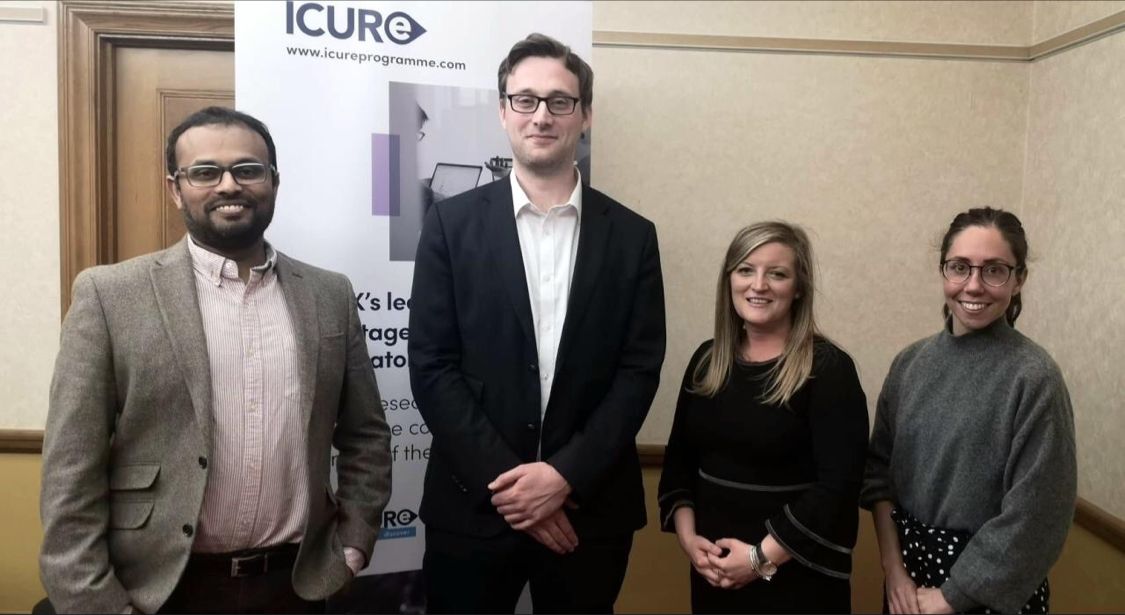SEARCH
Enter your search term below:
Close
Enter your search term below:

WORLD LEADING BUSINESS SUPPORT

(Image: Gowsh Poologasundaramapillai (left) and Sam Moxon (second left), Co-Founders of AEGIS FIBRETECH)
Developed by the research team at the University of Birmingham, BIOWOOL, a bioactive, degradable graft material, was thought to be applicable exclusively within healthcare. They investigated the effects of bioactive glass doped with ionic silver on biofilms formed by Pseudomonas aeruginosa, a multi-drug resistant bacterium that easily forms biofilms and is a common cause of infection in chronic wounds.
But now, thanks to the ICURe programme, this novel material is being tested for application across a number of other sectors.
Collaboratively, Sam and his research partner Gowsh Poologasundaramapillai have taken this innovation through the full ICURe programme – starting on ICURe Discover before progressing onto Explore and most recently, Exploit.
We caught up with Sam to discuss BIOWOOL, how the programme helped them explore new markets, and why commercialisation training should be mandatory for the university research teams.
Gowsh actually developed the product a number of years ago while working in Japan. He took a material that was already FDA-approved for dentistry and found a new way of manufacturing it into a network of fibres to help regenerate bone growth. There are cases where there isn’t enough bone for an implant to be put straight in, so the dentist has to use a grafting material to help grow new bone in that area. From speaking with clinicians, we found that the existing materials used aren’t necessarily fit for purpose, as they can cause damage to the surrounding area. So, with the material we’ve developed, we could relieve all of those pain points.
We joined the programme with the view to commercialising a denser version of this material for dentistry, but the first thing we were taught in the boot camp is simply to forget all assumptions. If it weren’t for that advice, we’d still be looking exclusively at dental applications, so try to forget everything you think you know about your technology and then start exploring new routes.
After going through the programme, we have now actually found another application for a different sector entirely, and we couldn’t have done that without the time and resources available through ICURe.
Sometimes, being told that your project isn’t going to work isn’t a bad thing. It pushes you to go out and find new areas of interest to explore, and that’s how we ended up where we are now.
Also, I learned so much about how things translate from a university setting into something you can actually sell, which is something that I don’t think universities are good enough at teaching people. I think I said in my ICURe exit interview, that I think anyone working in biomedical development should have to do something like this, to understand how to take their work to the patients who need it.
After completing Explore, we were recommended to go down the spin-out route but explore other markets where we could find really good traction. They said that there was potential in the dental market, but it needed more work to be able to tap into some of the grants you can get for that.
We’ve been pursuing both applications since then, and earlier this year were awarded a grant from the Medical Research Council to carry on the dental work toward a clinical trial. We’re set to start that stage soon, but we’ve also been back in the lab to gather more data on the heat shielding side of applications.
We also went through ICURe Exploit, have registered the company, AEGIS FIBRETECH, and are raising funding to officially launch the company in a couple of months time.
I really would recommend the ICURe programme to any academic researcher thinking about commercialising their research. It changed the way I thought about where I wanted to go and what kind of career I wanted. I’ve gone from thinking that I was going to be a traditional academic, to now wanting to explore the commercialisation side of things more which is fantastic. The skills, knowledge and opportunities gained have been invaluable.
Discover upcoming ICURe cohortsGet all the fresh insights first! Stay up-to-date with all the
latest investment news, blogs and all things SETsquared.
Close
Close